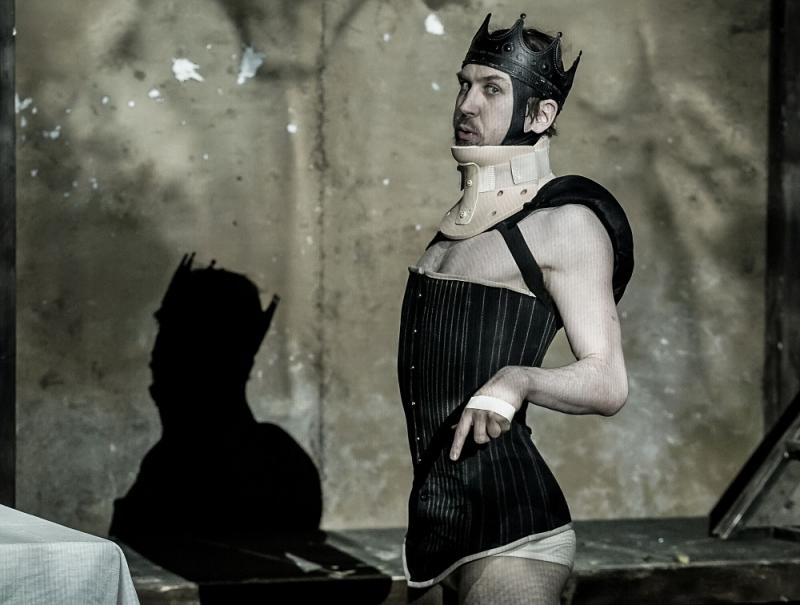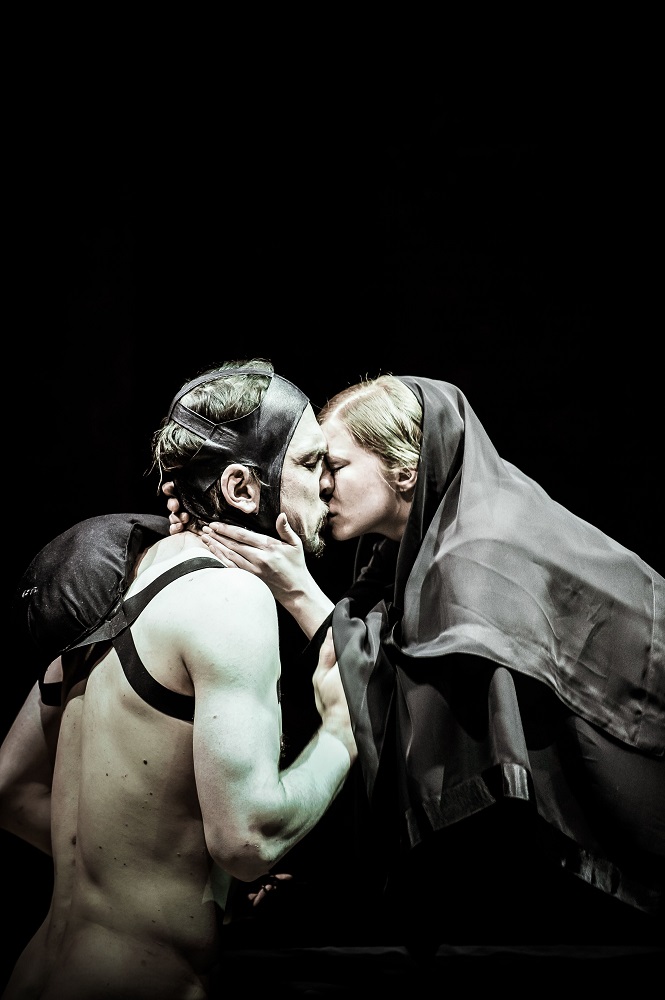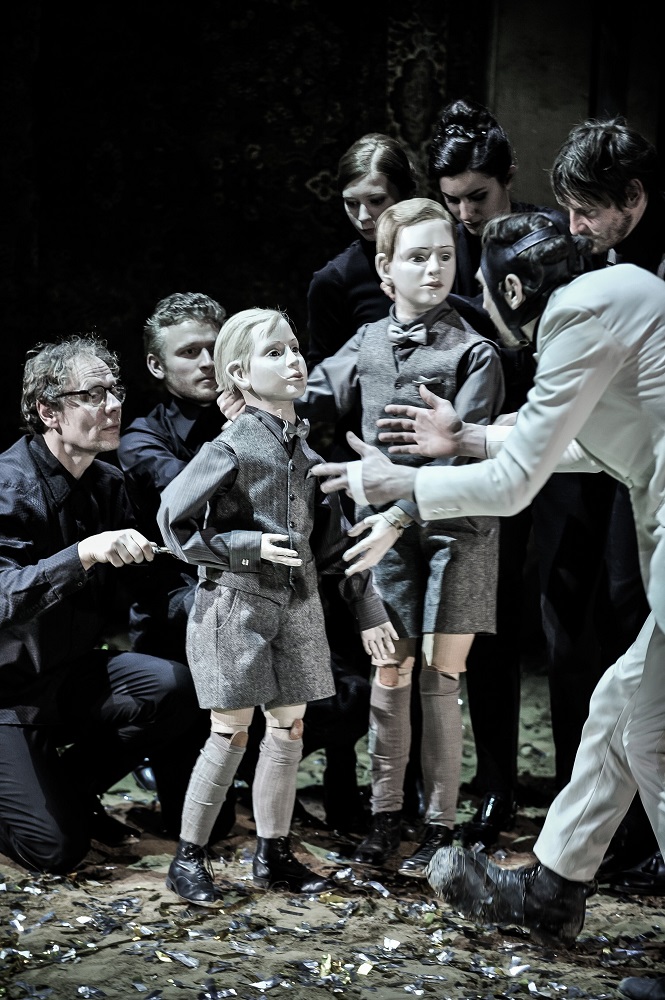Richard III, Schaubühne Berlin, Barbican | reviews, news & interviews
Richard III, Schaubühne Berlin, Barbican
Richard III, Schaubühne Berlin, Barbican
More or less a one-man show, but the denouement justifies everything

Hated the Schaubühne Hamlet (same lead actor, same director as this latest Shakespeare auf Deutsch); loved Ivo van Hove's Toneelgroep Kings of War, with Hans Kesting's Richard III on the highest level alongside the Henrys V and VI.
And the stage - in Jan Pappelbaum's designs, mud walls divided by a central entrance covered by an oriental rug and a sandpit that gets studded with gold and silver streamers, like an Anselm Kiefer painting - is all Richard's. We've laughed at the way his most skilled portrayers work the audience - Mark Rylance's Globe king the funniest of them all - but this spider's appeal to have us complicit in his web-weaving only makes his isolation in his narrower world the more frightening. We see him limping around the edge of the party at the start, grabbing an illuminated, dangling mike to break into the loud dance music - memorable work from composer Nils Ostendorf, enriched by the live percussion of Thomas Witte - and telling us his thoughts.
 Then he turns utterly plausible and natural in every meeting with his pale enemies or stooges. While everyone else at court seems terrified of human contact, Eidinger's Richard is the supreme hugger. We believe him, too, for the duration, and then, weirdly, begin to pity him when it goes too far. As Ostermeier points out in a too-brief programme interview, there's no leader like this one on the scene today - that we know of, anyway - so despite modern dress the situations still feel timeless.
Then he turns utterly plausible and natural in every meeting with his pale enemies or stooges. While everyone else at court seems terrified of human contact, Eidinger's Richard is the supreme hugger. We believe him, too, for the duration, and then, weirdly, begin to pity him when it goes too far. As Ostermeier points out in a too-brief programme interview, there's no leader like this one on the scene today - that we know of, anyway - so despite modern dress the situations still feel timeless.
Even the most implausible capitulation, that of the widow Anne (played in subdued fashion by Jenny König) whose husband he's murdered, gets an extra kick when Richard strips off and presents his naked body to the sword (pictured above). Ostermeier is always alert to parallels. The nakedness of Clarence in his cell, faced with two inept (and briefly funny) assassins, is exposure for real. And in the symmetry created alongside Marius von Mayenburg's prose translation, memorable lines repeated in English return in the context of Richard's last big soliloquy, beautifully spoken ("I myself find in myself no pity to myself" will chill you in both languages).
Eidinger repeats the jolting success of his Hamlet in stepping out of Shakespeare's text for audience participation. There's a scene in which we're asked to join him in lines about pussy and shit, which would work if the majority had been chilled to the bone by the monosyllabic sound he's started to hear in his head - a doom beat heralding disintegration. But last night's crowd were a touch too ready to laugh and join in. The spell briefly broken, though, the sound simply becomes more persistent, and Eidinger's second audience-testing about whether we hear what he hears - at which point the sound briefly stops - is more in keeping. This is Ostermeier's reversal of Van Hove's coup, where low-level sound controlled by an onstage DJ burst into violent life at the two-thirds mark. Here, the rest moves inexorbly towards silence.
 Shakespeare makes it easier for us to side with Richard when the opposition is so weak - old Margaret excepted. She's played by Robert Beyer in a constrained move from the usual melodrama, with the result that she has little impact at all, and the climactic Greek-tragedy cursing in which she's joined by Elizabeth and Richard's mother - excised here completely - has got the chop, as so often alas these days, so there's no viable moral challenge. Perhaps Ostermeier wants us to see everyone around Richard as lacking what it means to be human, twisted in him, of course, but there in spades. The point may extend to the clever idea of the princes going to the Tower being puppets who speak in adult voices (pictured right). But unlike Eidinger, the other actors are dull of tongue and quietish (don't they teach voice projection on the continent?)
Shakespeare makes it easier for us to side with Richard when the opposition is so weak - old Margaret excepted. She's played by Robert Beyer in a constrained move from the usual melodrama, with the result that she has little impact at all, and the climactic Greek-tragedy cursing in which she's joined by Elizabeth and Richard's mother - excised here completely - has got the chop, as so often alas these days, so there's no viable moral challenge. Perhaps Ostermeier wants us to see everyone around Richard as lacking what it means to be human, twisted in him, of course, but there in spades. The point may extend to the clever idea of the princes going to the Tower being puppets who speak in adult voices (pictured right). But unlike Eidinger, the other actors are dull of tongue and quietish (don't they teach voice projection on the continent?)
Give them a microphone, and they can make more impact, which is why the ghostly visitation in Richard's sleep works so well, helped immensely by Erich Schneider's always effective lighting design. Ultimately the stage is left to its protagonist, and in the last 10 minutes you'll see theatre at a level we rarely get here, including what is described in the programme credits as "stage combat", but with a twist. To say more would spoil the ultimate effect of what is a thrilling performance by Eidinger and a flawless piece of work from Ostermeier.
rating
Share this article
Add comment
The future of Arts Journalism
You can stop theartsdesk.com closing!
We urgently need financing to survive. Our fundraising drive has thus far raised £49,000 but we need to reach £100,000 or we will be forced to close. Please contribute here: https://gofund.me/c3f6033d
And if you can forward this information to anyone who might assist, we’d be grateful.

Subscribe to theartsdesk.com
Thank you for continuing to read our work on theartsdesk.com. For unlimited access to every article in its entirety, including our archive of more than 15,000 pieces, we're asking for £5 per month or £40 per year. We feel it's a very good deal, and hope you do too.
To take a subscription now simply click here.
And if you're looking for that extra gift for a friend or family member, why not treat them to a theartsdesk.com gift subscription?
more Theatre
 Troilus and Cressida, Globe Theatre review - a 'problem play' with added problems
Raucous and carnivalesque, but also ugly and incomprehensible
Troilus and Cressida, Globe Theatre review - a 'problem play' with added problems
Raucous and carnivalesque, but also ugly and incomprehensible
 Clarkston, Trafalgar Theatre review - two lads on a road to nowhere
Netflix star, Joe Locke, is the selling point of a production that needs one
Clarkston, Trafalgar Theatre review - two lads on a road to nowhere
Netflix star, Joe Locke, is the selling point of a production that needs one
 Ghost Stories, Peacock Theatre review - spirited staging but short on scares
Impressive spectacle saves an ageing show in an unsuitable venue
Ghost Stories, Peacock Theatre review - spirited staging but short on scares
Impressive spectacle saves an ageing show in an unsuitable venue
 Hamlet, National Theatre review - turning tragedy to comedy is no joke
Hiran Abeyeskera’s childlike prince falls flat in a mixed production
Hamlet, National Theatre review - turning tragedy to comedy is no joke
Hiran Abeyeskera’s childlike prince falls flat in a mixed production
 Rohtko, Barbican review - postmodern meditation on fake and authentic art is less than the sum of its parts
Łukasz Twarkowski's production dazzles without illuminating
Rohtko, Barbican review - postmodern meditation on fake and authentic art is less than the sum of its parts
Łukasz Twarkowski's production dazzles without illuminating
 Lee, Park Theatre review - Lee Krasner looks back on her life as an artist
Informative and interesting, the play's format limits its potential
Lee, Park Theatre review - Lee Krasner looks back on her life as an artist
Informative and interesting, the play's format limits its potential
 Measure for Measure, RSC, Stratford review - 'problem play' has no problem with relevance
Shakespeare, in this adaptation, is at his most perceptive
Measure for Measure, RSC, Stratford review - 'problem play' has no problem with relevance
Shakespeare, in this adaptation, is at his most perceptive
 The Importance of Being Earnest, Noël Coward Theatre review - dazzling and delightful queer fest
West End transfer of National Theatre hit stars Stephen Fry and Olly Alexander
The Importance of Being Earnest, Noël Coward Theatre review - dazzling and delightful queer fest
West End transfer of National Theatre hit stars Stephen Fry and Olly Alexander
 Get Down Tonight, Charing Cross Theatre review - glitz and hits from the 70s
If you love the songs of KC and the Sunshine Band, Please Do Go!
Get Down Tonight, Charing Cross Theatre review - glitz and hits from the 70s
If you love the songs of KC and the Sunshine Band, Please Do Go!
 Punch, Apollo Theatre review - powerful play about the strength of redemption
James Graham's play transfixes the audience at every stage
Punch, Apollo Theatre review - powerful play about the strength of redemption
James Graham's play transfixes the audience at every stage
 The Billionaire Inside Your Head, Hampstead Theatre review - a map of a man with OCD
Will Lord's promising debut burdens a fine cast with too much dialogue
The Billionaire Inside Your Head, Hampstead Theatre review - a map of a man with OCD
Will Lord's promising debut burdens a fine cast with too much dialogue

Comments
incisive review - and no
I saw this production at the
We saw Richard III at London